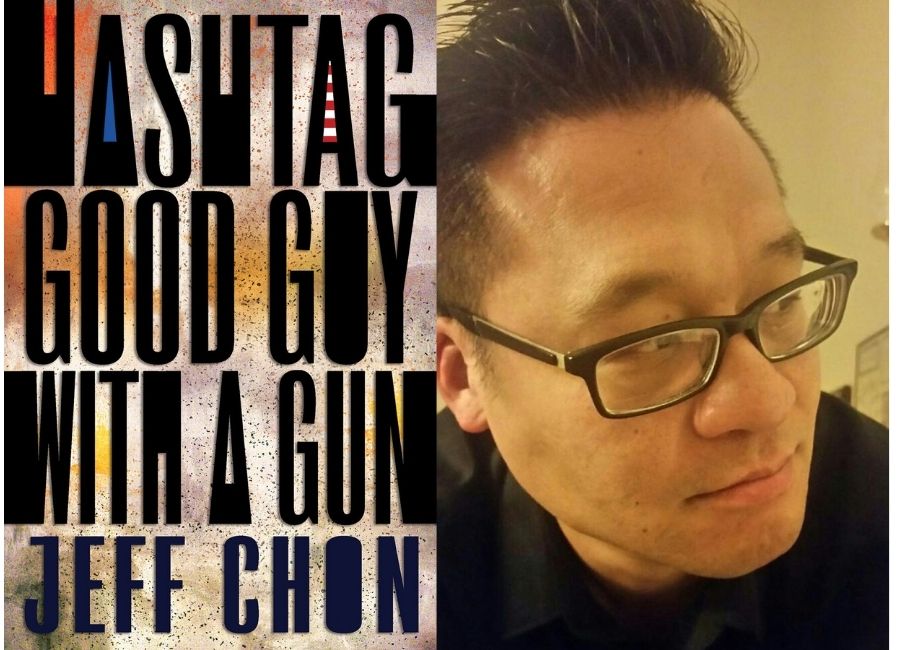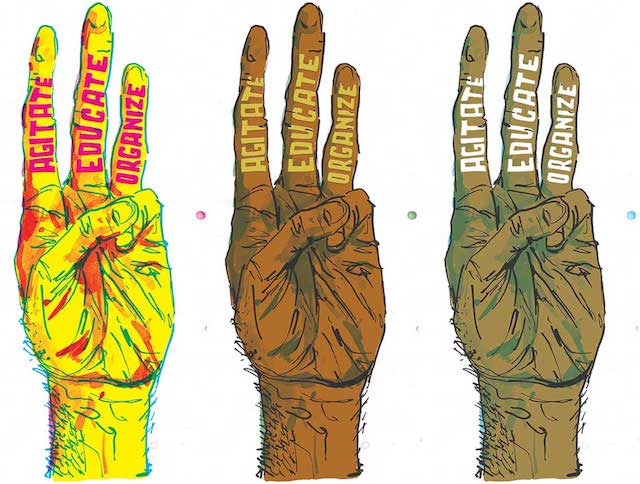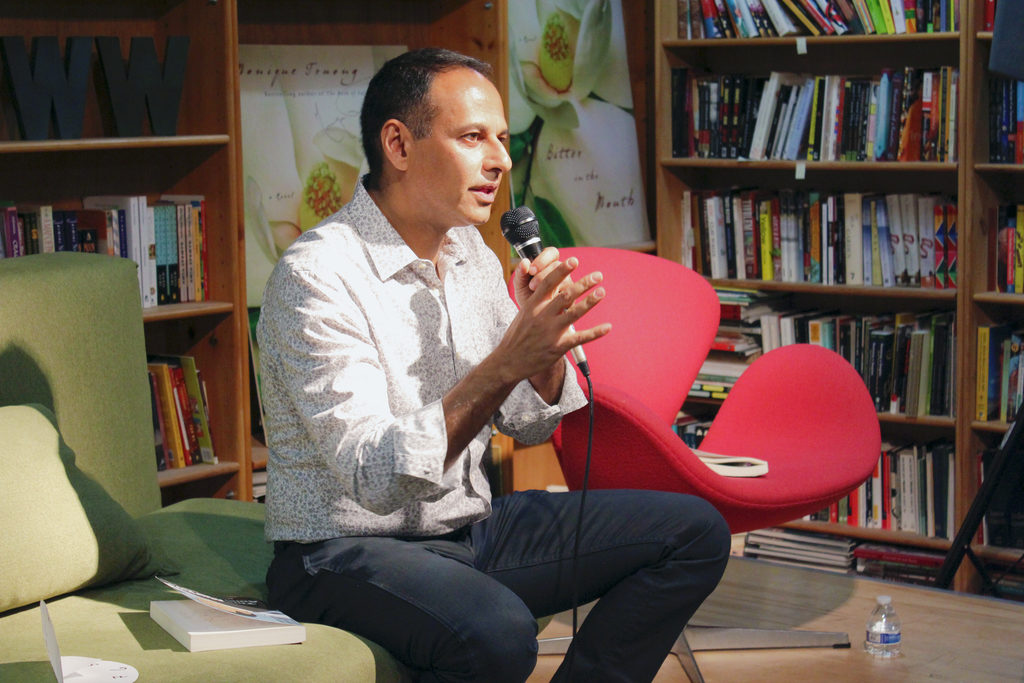“What people say about the patriarchy hurting men is true. Men benefit from it, but it also hurts them.”

September 1, 2021
Jeff Chon’s debut novel, Hashtag Good Guy with a Gun, starts off like any other day in the United States: a man with a gun goes to a public place—in this case, a pizza parlor—with a certain idea in his mind (that politicians are keeping kids locked up in a dungeon inside said pizza parlor). Shots are fired. Someone dies. That it rings so true to our current moment in the United States—when 316 people are shot per day and conspiracy theories like Pizzagate take root—speaks to our terrible and surreal reality, one that intensified the night of the 2016 presidential election. How did we get here? Hashtag Good Guy with a Gun aims to explore that question through the story of Scott Bonneville, the man with the gun. A half-Korean son of a white cult leader, Scott searches for meaning, power, and love—a journey that leads to a series of events that will change the lives of those around him in Portland, Oregon, particularly his girlfriend, Lisa, and her son, Blake, who gets involved with an incel society.
For Chon, who began writing this novel before Trump took office, Trump is a symptom of something much bigger—and that something has been festering for a very long time, so long that Trump is really just inevitable. And if Trump is just a symptom, surely the disease isn’t gone yet.
I recently talked to Chon over Zoom about Hashtag Good Guy with a Gun, at once an intelligent satire as well as an empathetic look into lives gone horribly wrong. Chon’s humor is biting, but underneath it is writing that takes risks and a curiosity that seeks to understand the most horrible parts of human nature. His book has the shock value of Chuck Palahniuk but the heart and narrative gestures of Karen Tei Yamashita. We talked about why someone might cling to a conspiracy theory, conservatism in Asian American communities, and toxic masculinity.
—Eric Nguyen
Eric Nguyen
I really loved Hashtag Good Guy with a Gun. What inspired you to write it?
Jeff Chon
It’s odd, I think what inspired me was Facebook. When I was still on Facebook, a lot of my acquaintances were starting to fall into this misinformation rabbit hole. This was before Trump. It didn’t take long before 9/11 trutherism or just flat-out Holocaust denialism happened. And when Trump happened, I realized there was something a little darker at play, and Trump seemed to be a sign of all those chickens coming home to roost in a way. So I thought, maybe there’s a Trump novel in there somewhere. Getting over the fear of writing a novel set during this election was the key.
As I got going, the incel thing, all that stuff started happening—I just realized that there’s an entire ridiculous world that I can mine for content.
EN
Hashtag Good Guy with a Gun is about people who believe in outrageous conspiracy theories. What’s interesting about it is that somehow you get into a space of empathy with your characters who come to believe these hurtful ideas, and you also make them seem very human. Can you tell me a little bit more about the research you did? And then also about empathizing with these people?
JC
The empathy part is a little hard to navigate because it doesn’t take much to pity them after you go to these message boards for a little bit. I had to stop because it was just so awful—you start thinking about what led a person to that.
At one time the novel was a lot more satirical, in that I wanted to make fun of these people. But the deeper I got into thinking about who [these people] were, I started feeling bad for them because I had to assume that, just from the things they were saying, a lot of them were fairly young or at least younger than me, and I know what it’s like to make wrong turns as a young guy.
I started thinking about all the wrong turns I’ve made in life. That got me thinking about their situations and imagining the life stories for people with these stupid usernames.
The research, I don’t know how much formal research was done for this. I did go down a lot of internet rabbit holes just to see where these things would go, and it felt really dirty in a lot of ways—it felt like going into an adult movie theater, I assume. That’s the kind of discomfort I felt that is akin to that.
EN
Given the big role contemporary issues play in this novel—like the incel movement and Trumpism—you’ve said it was difficult to get published. You’ve said one editor declined this book because he felt Trump might be irrelevant after the election. Now it’s 2021 and Trump is no longer in office. How do you see this book as relevant now?
JC
It’s still relevant because for me it was never really about Trump. He’s just the latest iteration of right-wing populism, and I feel like another Trump will be along the way and he’ll probably be much worse.
I didn’t really concentrate too much on relevance in the long run while I was writing this. I imagine a lot of writers don’t think about relevance because it’s not really up to me whether something stays relevant or not. I just wanted to try to tell a story as honestly as I could and react to the world around me more than I wanted to write something that would stand the test of time. I don’t know if immortality is something we think about when we write.
EN
Yeah, as a writer, I feel like we’re all storytellers just telling whatever stories hit our hearts or our brains at that time.
I read this book in the aftermath of the 2020 election. There was a lot of support for Trump within the Vietnamese American community, and I connected that to the Asian character you have here, Scott. He’s biracial—half white, half Korean.
Why do you think Asian Americans would be drawn into Trumpism or, in Scott’s case, conspiracy theories? Why would they buy into ideas that don’t really help them in the end? In your book’s case—Scott’s belief about politicians killing kids for energy à la Pizzagate—it doesn’t really help him at all. In fact, it destroys his life.
JC
I feel like Trump had a lot of support in the Korean American community as well. I wonder if in the Vietnamese community and Korean community, there’s a certain generation who were traumatized by communism. I know a lot of Koreans grew up hearing air-raid sirens because they were always trying to be prepared for a North Korean attack, so I wonder if that has less to do with Trump and more with what they know about communism, how it affected their lives at one point, and how they internalized that. I know a lot of my relatives are fairly anticommunist. When I was a little kid, we’d watch these adventure cartoons where North Koreans were portrayed as red-skinned demons.
As far as conspiracy theories, I don’t know if the conspiracy theory is something unique to cultures. I’m sure every culture has its own version of conspiracy theories that people buy into. And it’s one of these things that I try to explore—this idea of how someone comes to believe in conspiracy theories. That’s something that fascinates me: watching the wheels turn in someone’s brain and seeing the leaps of logic they make, and where exactly they make that strange turn toward something that’s not plausible or even remotely believable.
EN
In your book, it’s not only Scott, the main character, and Blake, his student, who get caught up in conspiracy theories, though they represent the extremes. There’s Lisa, Scott’s girlfriend and Blake’s mother. One of the arguments she and Scott has is that she believes in small conspiracy theories about natural food and odd health cures. I feel like that really shows how conspiracy theories or misinformation are embedded in our culture in a way. How do you see conspiracy theories functioning in society?
JC
Facebook is really good at creating these little bubbles. The natural news stuff with Lisa was something I found fascinating because a lot of my friends believed in those natural news sites too. And when you follow enough of those natural news sites, you follow the links and they take you to things like 9/11 trutherism, which is bizarre. All these people run in the same circles, and it’s almost like that’s what they’re using to radicalize women, to be honest, because I mean it’s no accident—when you look at what happened on January 6, 2021 and you see a lot of the women that got arrested. A lot of these women were wellness influencers, but they were also QAnon adherents.
I feel like they radicalize men through making them feel insecure about their masculinity. With women, I think they might use these health and wellness trends that play off of guilt in a lot of ways—maybe you’re not doing enough for your kids, or you’re not living this healthy lifestyle. And that was something I wanted to play up with Lisa, this idea that even some of these “harmless” beliefs she has have the potential to radicalize in the long run.
EN
You mentioned briefly the insecurity of men and masculinity. I feel like that’s really where the character Blake and his circle of friends come into play. They develop a whole code of manhood, which includes working out and building a perfect male body. They watch porn together before lifting weights. They abstain from masturbation. They develop rules for drinking Gatorade, even.
So what is wrong with men? What do you think is wrong with men today and contemporary masculinity? And what ways do you see out of that toxic masculinity?
JC
Oh wow—what isn’t wrong with men?
What people say about the patriarchy hurting men is true. Men benefit from it, but it also hurts them and degrades them in a lot of ways. There are these standards that men have to live up to. We get hardwired to believe that this is the way men are supposed to be and this is the way women are supposed to be. And as much as we fight and want to fight it, as much as we like to think of ourselves as enlightened, I think it’s something everybody still struggles with, this idea of masculinity. And then with us as Asians, there’s another added layer, which is this idea that we’ve been desexualized since we got here. I don’t know how we get past it. I just know that people are trying a lot harder than they were when I was younger.
EN
One of the things that really interested me was the fictional story you entitled “The Sad Tale of Old Hwang” at the beginning of the book. Old Hwang is a general who was known as a village coward for hiding while his battalion was slaughtered. Because of this, his seven sons remain virgins because no family would give away their daughters as brides to Old Hwang’s family. His shame is so great that when it’s time to die, the god of death lets him live until his sons are married.
This myth is something that weaves into the narrative for most of the book, reoccurring in different and interesting ways. I read it as an incel-esque mythology that kind of goes with the conspiracy theories your characters come to believe. How did you come up with adding this story to your novel?
JC
That prologue to me was very important. Part of me didn’t believe I had a book until I was able to come up with that story. It talks about this idea of masculinity and this idea of what makes a man, and not just with Old Hwang but with his sons also. There’s this idea that fate doesn’t always play out the way you think it does, and that we tend to see signs that aren’t there.
Being able to bring that into existence really helped bring this book together because it’s an abstract to the novel in a lot of ways. It’s one of my favorite things in the book, as short as it is and as fleeting as it seems in the beginning.
EN
For me, it was a pleasant surprise. I read the synopsis and was expecting this very contemporary novel about guns and politics, and it is, but it starts with this mystical mythology told in a very different tone. It surprisingly fits the novel the more we see it, and I’m glad you could add it.
So my last question is, what do you hope the reception of this book is? And what do you want readers to take away from it?
JC
I don’t know if I can control that. I hope that people enjoy it. I want people to be entertained in some way, and I hope that people are able to appreciate the work that went into it.
And what I want readers to take away? I want people to be kinder to one another. Empathy is important for me, and I think it’s hard for us to feel bad for certain people. But I think we should make the effort to feel bad for people. I know we don’t want to feel bad for people like [my characters], but having lived with these people for countless drafts of this novel, I do feel something for them. And watching what happened on January 6 made me sad. I don’t know if people like that can turn their lives around or if they can even be saved, and I’m not saying that we should try to save them, but I hope we can maybe see that they’ve been lied to like the rest of us. They’re just so close to getting it, but they just don’t.



